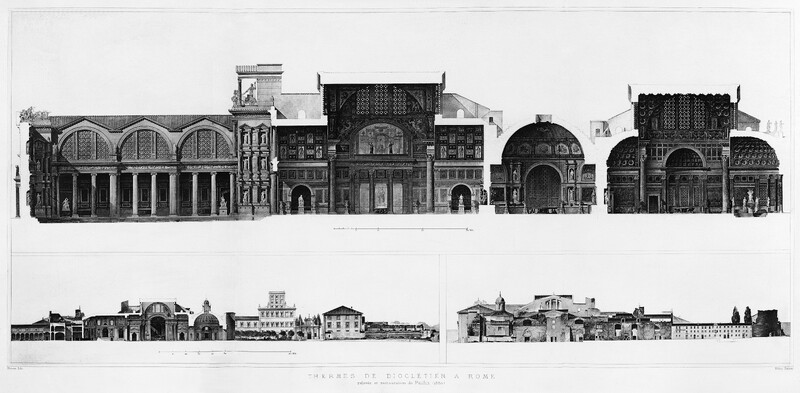Baths of Diocletian
Item
- Title
- Alternative Title
- Drafter
- City
- Address
- GPS
- Location
- Building Creation Date
- Century
- Description
- Classification
- Building Type
- Documentation Type
- Style/Period
- Cultural Context
- Subject
- Source
- Access Rights
-
Baths of Diocletian
-
Thermae Diocletiani
-
Heliog J. Chauvet
-
Rome, Lazio, Italy
-
northeast summit of the Viminal Hill
-
area is bordered by Via del Viminale, Piazza della Repubblica, Via Cernaia, Via Volturno, Piazza dei Cinquecento and Via XX Settembre
-
54.4
-
Italy
-
298-306 CE (creation)
-
3rd century
-
4th century
-
restored cross section of main building
-
cross section of master plan
-
current side elevation, sections
-
Diocletian’s largest single project in Rome was the great baths that bear his name on the Viminal Hill (ca. AD 298-ca. 306). Their layout owes much to the Baths of Caracalla, although they are even larger in scale. The central bathing block is a building of considerable complexity with its changing rooms, open-air swimming pool, bathing halls, hot and cold pools, palaestrae (exercise grounds) and warren of service corridors and furnace rooms. Many of the rooms have been preserved because various parts later were converted to ecclesiastical or other use. Parts of the frigidarium were transformed by Michelangelo into the church of S Maria degli Angeli (1566), with the result that some of the original spatial and lighting effects of the interior can still be appreciated. The church of San Bernardo alle Terme uses one of two circular rooms and the main hall and octagonal aula are parts of museums.
-
Architectural Documentation
-
sections
-
elevations
-
Imperial (Roman)
-
Ancient Roman
-
botanical
-
rulers and leaders
-
Diocletian, Emperor of Rome, 245-313
-
Restoration and conservation
-
Roman Empire
-
architectural reuse
-
Seure, Georges. Monuments antiques, relevés et restaurés par les architectes pensionnaires de l’Académie de France à Rome
-
notices archéologiques par Georges Seure. Paris: C. Massin, 1910, 164-166.
-
Public Domain
- Item sets
- Architecture Illustrations
“Baths of Diocletian”, Arch Design Images, accessed February 24, 2026, https://exhibits.lib.ttu.edu/s/archlib/item/18869


